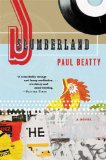Page 1 of 1
There is 1 reader review for Slumberland
Write your own review!
 Cloggie Downunder
Original, incisive and funny.
Cloggie Downunder
Original, incisive and funny.
“The Schwa ruffled the pages of the book over his pant seam, and the resulting sound rivaled that of the best Max Roach brushwork. I nearly fainted. He lifted the book to his mouth and played chapter seven like a diatonic harmonica; blowing and drawing on the pages like leaves of grass in the hands of Pan. Who knew a Signet paperback was in the key of D? For the more percussive sounds he rapped the spine on his elbow, thumb drummed page corners, pizzicatoed the preface, flutter tongued the denouement and bariolaged the blurbs.”
Slumberland is the third novel by Man Booker Prize-winning American author, Paul Beatty. Ferguson W. Sowell, aka DJ Darky has a talent for DJing, and says “I compensate for a lack of skills and Negritude with a surfeit of good taste and a record collection that I like to think is to DJing what the Louvre is to painting.” He has spent months trying to compose his perfect beat, and it’s almost there: in the parlance, it is “presque parfait”.
The Beard Scratchers, members of his record pool, agree. After much analysis, they hit upon the missing element: it needs to be ratified by their ultimate beat break, the elusive Charles Stone, aka the Schwa. Coincidentally (or perhaps not quite?), Ferguson comes across a porn tape sound-tracked with music certain to be the Schwa’s. The trail leads to East Germany and, with some help from the Beard Scratchers, Ferguson finds himself engaged as a Jukebox-Sommelier at the Slumberland Bar in Berlin.
It is a Berlin about to tear down its Wall, and Ferguson is somewhat surprised to find that others share his love of the Schwa’s music: he is assisted in his quest by a bartender, a journalist, a Stasi agent, a pair of German negro sisters, and, eventually, the clientele of the Slumberland. Through a number of quirky characters and some crazy, laugh-out-loud events, Beatty examines the experience of the negro in Germany.
One World have produced editions of Beatty’s four novel with themed covers and this one has LP discs on the cover. A knowledge and appreciation of jazz is bound to enhance the enjoyment of this story, but is not essential, because the plot and characters are strong enough to draw the reader in. The musical descriptions certainly make the reader wish to hear the Schwa’s music. There’s plenty of wit and black humour in Beatty’s lyrical prose. Original, incisive and funny.
